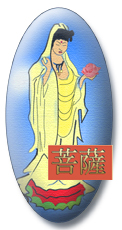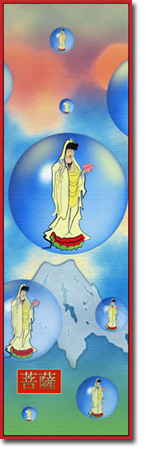On The Way: The Daily Zen Journal
The Sermon of No Words
Rosen Takashina (1876- 1968)
There is an ancient saying: “Better an inch of practice than a foot of preaching.” It refers to the sermon preached by the body itself, through action and without speaking.
The sermon of words and phrases is the finger pointing to the moon, the fist knocking at the door. The object is to see the moon, not the finger, to get the door open and not the knocking itself; so far as these things do achieve their objective they are fine.

The object of the Buddha’s life of preaching was not to turn words and phrases. The Diamond Sutra compares his sermons to a raft, which is only an instrument for reaching the far shore. The sermon, which is an instrument, can be discarded after a time, but the real preaching—which is not discarded—is the preaching by the body itself.
As to what that preaching may be, the truth of it is very profound, but in simple language, it means that others receive right inspiration from that person. It is said that when a Bodhisattva has continued spiritual practice for three kalpa-ages they are qualified to be a Buddha.
After a hundred ages, their appearance becomes majestic. This does not mean anything outwardly magnificent, but it means that in helping others, the manner in which the thing is done is of first importance, and through the force of wisdom and compassion there manifests in one a peculiar dignity and tenderness. By contemplating the form of Bodhisattvas like Kannon and Jizo, one’s heart becomes somehow softened, but along with that there is something awe-inspiring which cannot be gainsaid.
When one feels it within all the time, it is naturally reflected in the outward appearance, and love and respect are attracted from others.
What gives us inspiration is the sermon of action of the Bodhisattva. They have the power to do it without uttering a word, but it is not to be confined to Buddhas and Bodhisattvas. For religious and other teachings, for all who stand in authority over many, as head of a household, with many dependants, or as an employer of a single man or woman, it is all important.

A sermon is not something said by the Buddha long ago, or prated nowadays from a pulpit. The sermon of words is like a sort of advertising puff; but the real sermon is when the employer acts as a right employer, the servant as a right servant, and so with the merchant and official. All things, dogs and cats, trees and grass, things animate and inanimate, have all, so to say, their right path, and, so far as they keep to it without faltering, it is the sermon of action.
A poem of Sontoku expresses it: “Without voice or incense, heaven, and earth are ever repeating unwritten scripture.”
The man called Reiun was realized when he saw the peach blossoms; then Kyogen when he heard a stone strike against bamboo. There are instances of people who having matured their spiritual training were then enlightened on seeing the flying petals or falling leaves of autumn. The Buddha himself had his great Realization on seeing the brilliance of the morning star.
In the same way, the mountains and rivers and sun and moon and stars, every morning and night, are preaching the sermon to bring us to realization.
We should understand that it is never effective merely to rebuke others harshly. Let each of us keep our own role and play it properly; then a beauty will manifest spontaneously; high and low will be affected and, one’s conduct will change to harmony and virtue.
Since the self is a creation of the mind and good and bad too are from the mind (or, rather, correspond to the spiritual beauty or ugliness of the person), the first thing is to train the mind. Training produces a charm and power which appear externally and affect others. There are various ways and means in spiritual training, but the first effect is faith.
One’s faith may be true or false, right or mistaken, shallow or deep, high or low, and so on. When this reverent faith bubbles up, our everyday nature of itself begins to shine with the light of compassion, and the beauty and power of the true Heart break forth, and we move in harmony with the Buddha-light. When this happens the virtues of the Buddha-body are ever in our breast, and from head to feet our action is prompted by the Buddha. Such is the life of faith, and in it, every incident preaches the sermon of action.
Those who have no light in their hearts are always in darkness, a darkness in which a hundred demons come and go. Under their sway, life goes from darkness to darkness, ordinances of heaven are broken, the way of man is transgressed, and finally, one is broken.
Faith is all-important to people, and it is given to us by religion. There are different religions also, but in Japan, Buddhism has come down in an unbroken stream for well over a thousand years and has deeply penetrated the life of the people.
If today the people live in the faith of Buddhism and in the Bodhisattva spirit preach the sermon of action, we … demonstrate the sermon of no words to the people of the world, and this is the supreme task today.
Rosen Takashina (1876- 1968)
Source – The Tiger’s Cave – Translations of Japanese Zen Texts Trevor Leggett 1964





Right action is one principle of the Eightfold Noble path in Buddhism. These are inspiring guidelines for a life of practice, however, lest we leave it as only pertaining to actions of “goodness,” it may leave us wondering at times what exactly is the right action in certain circumstances.
As I read the above piece I immediately thought of a parable we had in practice years ago, the “Parable of the snake that refused to hiss”. There are many sides to consider in determinig what is right action…in this parable we see another, complex element to right action. Sometimes the soft response is not always the most effective…
“Some cowherd boys used to tend their cows in a meadow where a terrible poisonous snake lived. Everyone was on the alert for fear of it. One day a brahmachari was going along the meadow. The boys ran to him and said; ‘Revered sir, please don’t go that way. A venomous snake lives over there.’
‘What of it, my good children?’ said the brahmachari. ‘I am not afraid of the snake. I know some mantras.’ So saying, he continued on his way along the meadow. But the cowherd boys, being afraid, did not accompany him.
“In the meantime the snake moved swiftly toward him with upraised hood. As soon as it came near, he recited a mantra, and the snake lay at his feet like an earthworm. The brahmachari said: ‘Look here. Why do you go about doing harm?
“‘Come, I will give you a holy word. By repeating it you will learn to love God. Ultimately you will realize Him and so get rid of your violent nature.’ Saying this, he taught the snake a holy word and initiated him into spiritual life.
“The snake bowed before the teacher and said, ‘Revered sir, how shall I practise spiritual discipline?’ ‘Repeat the sacred word’, said the teacher, ‘and do no harm to anybody.’ As he was about to depart, the brahmachari said, ‘I shall see you again.’
“Some days passed and the cowherd boys noticed that the snake would not bite. They threw stones at it. Still it showed no anger; it behaved as if it were an earthworm. One day one of the boys came close to it, caught it by the tail, and, whirling it round and round, dashed it again and again on the ground and threw it away. The snake vomited blood and became unconscious. It was stunned. It could not move. So, thinking it dead, the boys went their way.
“Late at night the snake regained consciousness. Slowly and with great difficulty it dragged itself into its hole; its bones were broken and it could scarcely move. Many days passed. The snake became a mere skeleton covered with a skin. Now and then, at night, it would come out in search of food.
“For fear of the boys it would not leave its hole during the day-time. Since receiving the sacred word from the teacher, it had given up doing harm to others. It maintained its life on dirt, leaves, or the fruit that dropped from the trees.
“About a year later the brahmachari came that way again and asked after the snake. The cowherd boys told him that it was dead. But he couldn’t believe them. He knew that the snake would not die before attaining the fruit of the holy word with which it had been initiated.
“He found his way to the place and, searching here and there, called it by the name he had given it. Hearing the teacher’s voice, it came out of its hole and bowed before him with great reverence. ‘How are you?’ asked the brahmachari.
“‘I am well, sir’, replied the snake. ‘But’, the teacher asked, ‘why are you so thin?’ The snake replied: ‘Revered sir, you ordered me not to harm anybody. So I have been living only on leaves and fruit. Perhaps that has made me thinner.’
“The snake had developed the quality of sattva; it could not be angry with anyone. It had totally forgotten that the cowherd boys had almost killed it.
“The brahmachari said: ‘It can’t be mere want of food that has reduced you to this state. There must be some other reason. Think a little.’ Then the snake remembered that the boys had dashed it against the ground.
“It said: ‘Yes, revered sir, now I remember. The boys one day dashed me violently against the ground. They are ignorant, after all. They didn’t realize what a great change had come over my mind. How could they know I wouldn’t bite or harm anyone?’
“The brahmachari exclaimed: ‘What a shame! You are such a fool! You don’t know how to protect yourself. I asked you not to bite, but I didn’t forbid you to hiss. Why didn’t you scare them by hissing?'”
Taken from Parables of Ramakrishna online source
In times requiring “right action” sometimes you have to get the person’s attention first, and that can assume a variety of forms that can sound like a hiss…This is not a plane of easy and pat solutions; finding common ground for that right action requires a pause and then action from stillness.
Pondering complexity together,
Elana, Scribe for Daily Zen